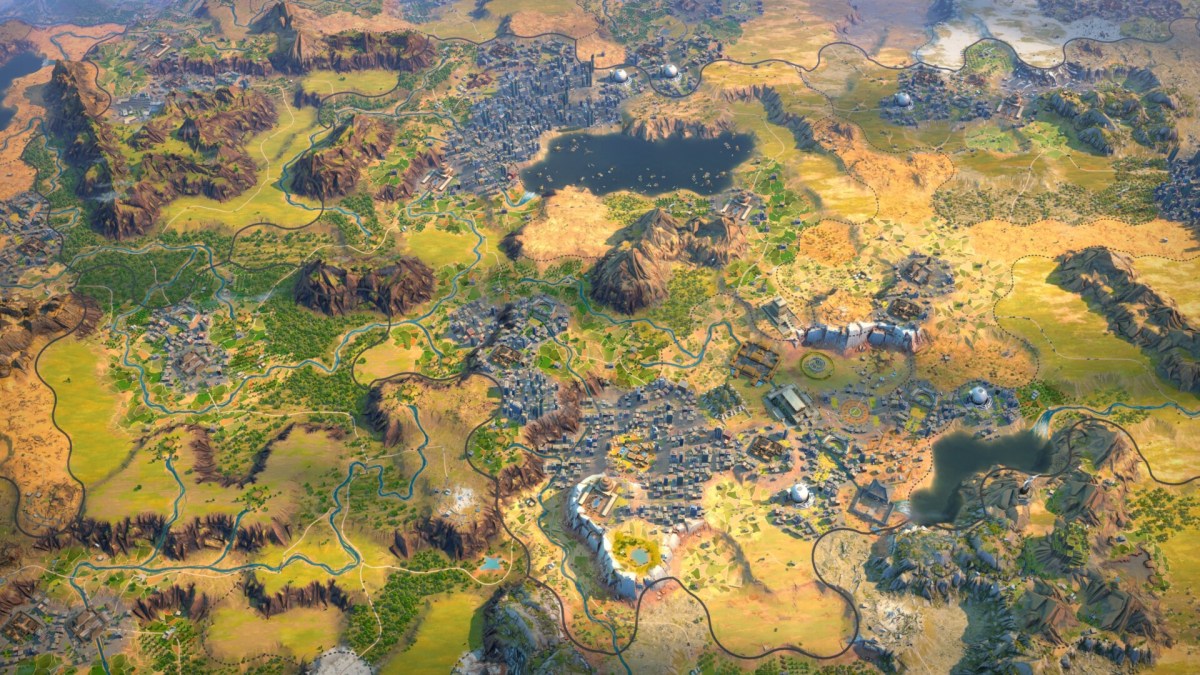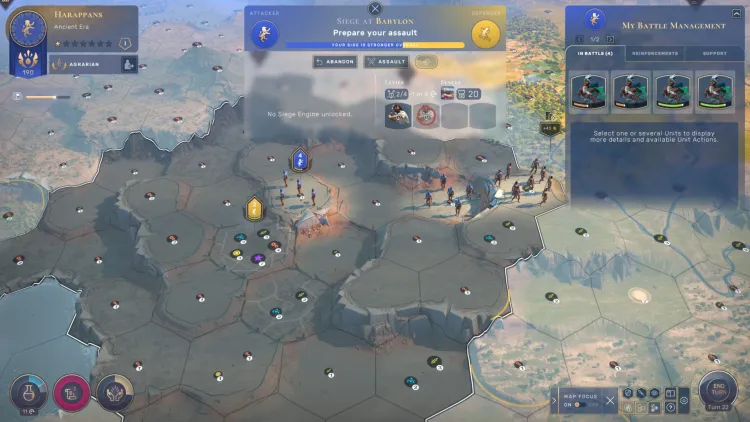Humankind is a brand new 4X strategy game that is set to release tomorrow. Considered by Amplitude Studios as its magnum opus, this highly ambitious offering aims to give you that feeling of wanting to finish “one more turn.” To a degree, it does succeed in this regard, although there are some notable flaws.
Prior to this, I had keenly followed Humankind by way of its OpenDev scenarios. From the first OpenDev scenario to builds such as Lucy and Victor, I was able to grasp the game’s scale and scope. Players were also able to provide feedback to the developers. Some issues were addressed in time for release, whereas others were still surprisingly present.
The 4X strategy genre: Humankind, Civilization, Age of Wonders, and the Endless games
A majority of 4X strategy games make you choose a faction, race, or nation at the start of each match. We’ve seen this in examples such as the Civilization franchise, the Age of Wonders series, and Amplitude Studios’ own Endless Legend and Endless Space games.
Humankind eschews these conventional norms by having you start as a tribe during the Neolithic Era. You are, technically, a barbarian unit without a place to call home. You’ll explore the map, picking up discoveries such as food and science, while battling mammoths and other animals to help your tribe grow. If your forces clash with hostiles, you’ll enter a turn-based tactical battle where you’d attempt to defeat your opponents (akin to Endless Legend and Age of Wonders).
Humankind‘s system lets you claim territories as part of your empire by erecting outposts. These territories encompass swathes of land, and within their borders you can exploit resources, construct holy sites or wonders, and plop down most districts as long as they’re adjacent to other districts. You can upgrade outposts into cities or attach outposts to cities, creating a contiguous domain under your control or a semblance of playing “tall.”
Humankind’s graphics are definitely top notch, and I can say that it is the most visually appealing 4X strategy game I’ve played thus far. Flowing rivers, lush forests, and towering mountains dot each generated map. You’d feel as though the world is alive and you’re out to see more of it.
Progression by way of eras, cultures, and fame
Your starting tribe in the Neolithic Era will eventually be able to choose a distinct culture (i.e., civilization) once you’ve reached the Ancient Era. The cultures in Humankind belong to a particular affinity (i.e., Aesthete for influence, Agrarian for food, Merchant for money, and so on). They have emblematic or unique quirks, such as traits, units, and districts. As you complete objectives in each era, you’re awarded fame points that increase your total score. It’s also possible to select the same culture throughout multiple eras, a method to “transcend” that gives you a bonus to the fame points that you obtain.
With seven eras from the Neolithic to the Contemporary and multiple cultures that you can pick, your run can have myriad combinations. Unfortunately, there are options that are significantly more viable than the rest. For instance, the Zhou, Mycenaeans, and Egyptians are decent picks during the Ancient Era. However, I prefer the Harappans because their focus on food allows you to grow cities a lot faster during the early game. Your tribal units are also automatically upgraded into Runners, stronger scouts who can help you rush. I’ve even won a game within 20 turns or so because of this strategy.
Then, there are the other choices in subsequent eras, some of which are clearly head and shoulders above the rest of the pack. The Huns (Classical Era) and Mongols (Medieval Era) are Militarist civs that let you raise a militia from your population. You can disband them in an outpost (considered an ordu if you choose these cultures) to recruit Hunnic or Mongol hordes. These nomadic horsemen can easily trounce most units at these stages of the game. Next, your military might and pillaging make way for the science gains from Joseon/Korea (Early Modern Era) and the French (Industrial Era).
This cookie-cutter example — Harappans -> Huns -> Mongols -> Joseon -> French — led to a few victories on “Empire” and “Civilization” settings (one notch below the highest difficulty). The choice for the Contemporary Era didn’t really matter since I had already eliminated the toughest contenders or I was leading the scoreboard.
Some notable issues in Humankind
Regrettably, Humankind has a plethora of notable issues. For starters, we have to take a look at its randomized nature. The first few turns are crucial as you grow your tribe, and discoveries that pop up on random tiles are vastly important. Your initial location isn’t always the most bountiful because the terrain or resources might not suit your needs. Next, if AI empires reach the Ancient Era first — thus selecting stronger cultures and leaving you with weaker options — you’ve got a lot of catching up to do. Humankind isn’t like Civilization where you can restart on the first turn if you don’t like the location. Sometimes, “bad RNG,” as well as instances such as nearby territories with poor yields, can occur much later. It can be an arduous task for those who like to min-max.
Additionally, certain mechanics are opaque and unclear at times. The in-game encyclopedia doesn’t help at all. Upon opening it, I was treated to a wiki-esque page that was fully zoomed out. I couldn’t figure out a way to zoom in which made the whole thing unreadable. Moreover, even after playing the previous OpenDev builds, it still took me a while to adapt to the civics/influence, diplomacy, and religion/faith systems. In the end, I simply accepted that these facets are merely passive in nature and I could ignore them (for the most part). They do play a role in conflicts, especially once your grievances turn into demands that can be used in peace deals.
Speaking of stuff that’s unclear, I also had a problem with navigation and moving units on the map. Although Humankind‘s visuals are superb, I sometimes found it hard to discern between different types of terrain. Ridges and cliffs might face the opposite side, and you’d be surprised when you realize that your units have to go the long way around. Likewise, I’d have to mention the slow movement speed of units and how other forces are traversing the map during your turn. I don’t know if this was intentionally designed to make the world more dynamic, or if this was simply an oversight that creates confusion.
Come to think of it, the retreat mechanic needs a bit of work, too. Since AI units tend to go across vast distances whenever they retreated, there were instances when you had to go back inside your own territory just to play Whac-A-Mole.
Combat woes, diplomacy, and war score
As mentioned earlier, Humankind has turn-based tactical battles whenever armies clash or when you attempt to besiege a city. You’ll deploy your units, place them on hexes, attack foes in melee, snipe them with archers from afar, or rush in with your cavalry. Later as you advance in tech, you’ll have access to naval units and aircraft.
Sadly, combat and warfare are also bogged down by restrictive systems. For example, I reached an impasse in one match where only one AI opponent remained. I couldn’t attack its domain because, oddly enough, it was besieging a city owned by free peoples (AI-controlled minor factions). Since sieges are limited to just one faction versus another, and because they encompass a certain area, I was prevented from lending aid or hammering my opponent’s flanks. I simply decided to skip turns over and over until I researched all the technologies (one of the ending conditions which I’ll discuss later).
I have to address the war score system as well. Some 4X games have tried to curb snowballing (i.e., Civilization has unhappiness and loyalty flipping). Humankind, meanwhile, goes the Paradox Interactive route by using the war support/war score mechanic. Once your enemy’s war support reaches zero, their surrender allows you to obtain territories that you initially demanded and those that you conquered.
Evidently, this curbs your ambitions since you can only take small chunks of a rival’s territories. I’ve won wars where I was already barging on the enemy’s front door, only to end up with just a handful of outposts/cities on the border due to the maximum allocated war score. Vassalization or wiping out an AI empire that has further expanded are tall tasks indeed.
Achieving victory in Humankind can be tedious
A key factor to consider when you play 4X games is wanting “one more turn.” That, eventually, leads to the completion of a run through several victory conditions. Unfortunately, Humankind only has one victory condition: having the most fame (i.e., a score victory). Still, there are several methods to conclude your campaign, such as reaching 300 turns (normal game speed), earning all Contemporary Era stars, researching all techs, destroying the other AI empires, vassalizing the other AI empires, sending a mission to Mars, or rendering the Earth unfit for life (like with nuclear war).
What you’ll notice is that these conditions lean towards the Domination and Science aspects that we’ve come to know in the Civilization games. There’s nothing related to Religious or Diplomatic victories. Even Amplitude Studios’ own Endless Legend and Endless Space had competitions based on constructing the most wonders, amassing huge amounts of dust (gold/money), and quest chain completions. Considering how you’d start from the Neolithic Era in each run, subsequent playthroughs can get a bit tedious.
Likewise, I should talk about the rather limited number of strategic resources, especially in normal-sized or smaller maps. In Humankind, the resources you own don’t gradually increase over time. If you don’t meet the base value requirement for a unit or project, then you’re going to have to search for the remaining nodes. Imagine my surprise when I played a match and, once I reached the Contemporary Era, I realized that the last nodes for uranium and aluminum are in the last city held by an AI opponent. Rather than end the game via a Mars mission or nuclear annihilation, I just conquered those lands to finish things off.
One small step
Yes, Humankind does have notable flaws that can make your playthroughs bothersome. In some cases, you might just choose the same cultures because they’re the most viable. In others, you’d find that the mid game onwards has you going through the motions. And, as cited earlier, the encyclopedia feature is barely readable.
Still, the game itself is fairly stable. I didn’t encounter any crashes or major bugs (most of my qualms were with the core mechanics). However, I did experience some slight slowdowns whenever I selected avatar, world, and AI empire settings.
Overall, Humankind can be a worthwhile game due to the plethora of options for you to try out and consider. It’s visually appealing, so it’s got the charm and flair to keep you engaged. There are even features that let you create your own avatar so your buddies can play against an AI opponent that you designed. Additionally, there’s a map editor that you can test and share, as well as mod support that’ll arrive soon.

















Published: Aug 16, 2021 10:00 am